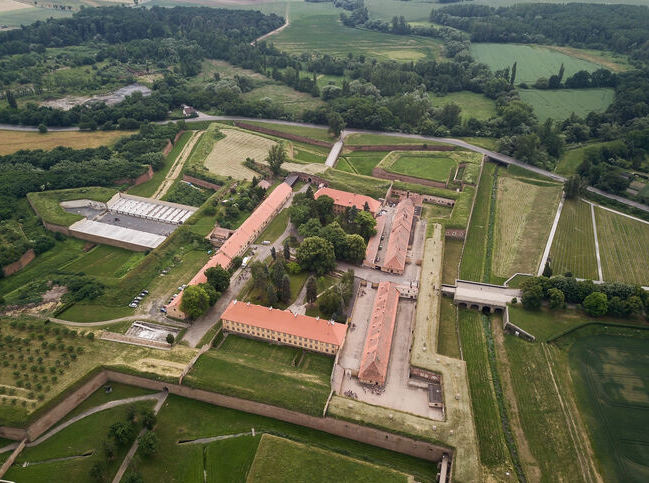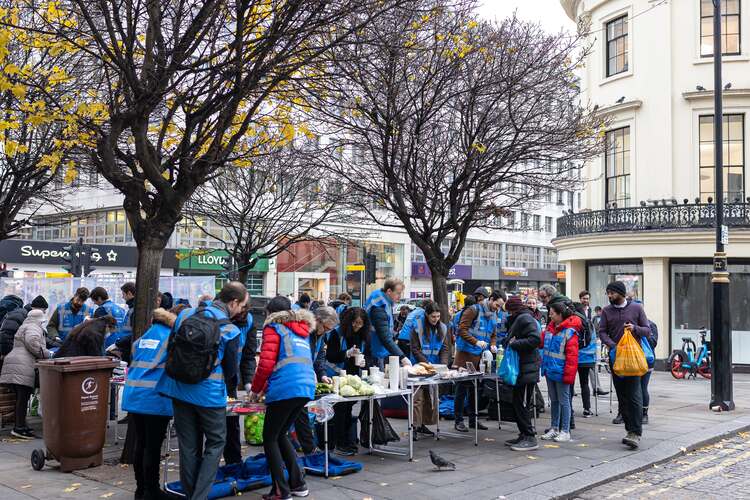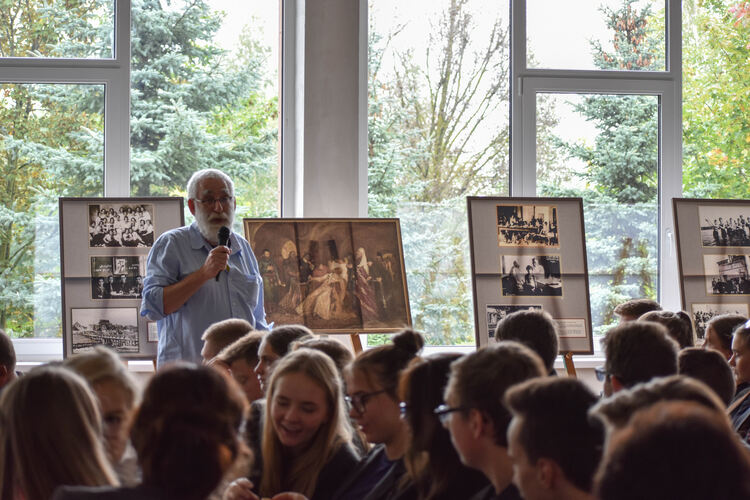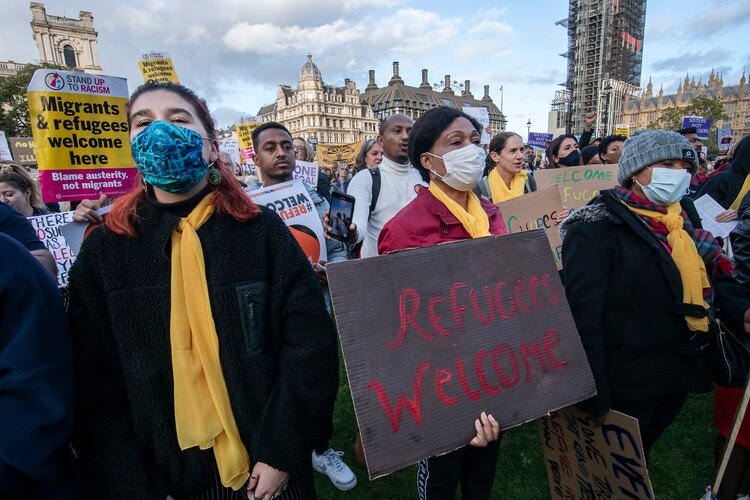
Refugee Week 2023’s theme is compassion – discover the vital role it played in rehoming 300 Jewish Holocaust children survivors
by Victoria Heath
The theme of Refugee Week 2023 – as it marks its 25th anniversary – focuses on compassion.
UCL Centre For Holocaust Education lecturer Helen McCord and Director of the Lake District Holocaust Project Trevor Avery discuss the important history of 300 Jewish children survivors of the Holocaust who came to Windermere in the Lake District and how compassion played a pivotal role in the boys’ arrival into a new country, and how we can continue to foster supportive environments for future refugees.
The story of the Windermere children
Trevor Avery first came across the story of the Windemere children in 2005, after he was told by an individual who visited one of his exhibitions.
‘I had no idea at all [about the story], and the people I immediately asked around had no idea either,’ Avery said.

Avery got in contact with Ben Helfgott, one of the children who came to Windemere at 15, and asked if Ben would allow him to put a memorial up to recognise the Windemere children story. He refused.
‘No memorial – we didn’t die, we came alive again at Windemere,’ was what Ben said, according to Avery.
And ever since, this sentence has become the mantra that Avery uses. Commemorate the story, but don’t memorialise it.
Avery met Ben, who arranged for him to meet with three more survivors in Manchester. Avery describes the survivors as ‘opening and welcoming’ – and one of the sons of the survivors believed it was because it was the first time anyone had paid an interest in their story.

The boys that arrived in Windermere – the youngest only two-years-old – were from several different concentration camps, including Theresienstadt, a camp which had faked normality and duped Red Cross into believing all other concentration camps were the same. Locked into a room at the beginning of the day, these children were left to their own devices for many hours while those who looked after them went to work as slave labourers.
‘The children not only didn’t trust adults, they actively despised them,’ Avery says.
Avery explains that the reason why the boys arrived specifically in Windermere was not as he expected.
‘When I first started, I thought the boys were brought to Windermere as an ideal place to recover and recuperate. But in actual fact, it was because on Calgarth estate, the war was over. There were family houses there, as well as hostels which accommodated workers in the factory who came without families. The workers went back after the war, so 300 rooms were then available in Calgarth.’
Soon after, a call came out from Theresienstadt asking for help in finding 300 youngsters a new home, and they were subsequently brought to Windermere, which had a bright and sunny spell of weather for the first few weeks of the boys’ arrival.
‘We were liberated in Theresienstadt, but we didn’t feel free until we got to Windermere,’ Avery recalls one of the survivors telling him.
‘The children were very demanding,’ Avery continues. ‘They were very insecure. But they had come from very close-knit communities, so they did have a basis to rebuild their lives on. The little ones didn’t have any memories at all, of even why they were liberated.’
Some of the youngest boys needed special care. Their troubled behaviour, including spitting, kicking and swearing calmed down with the presence of security, stability and love. Avery believes that the boys’ arrival as a large group had an advantage over Holocaust survivors who came alone – the boys had each other.
However, Avery is quick to point out that these boys still had issues for the rest of their lives – but is reluctant to use the word ‘traumatised’ to describe their experiences.
‘For some of the guys, the older teenagers, they didn’t like being labelled as traumatised. You know, I think Marie Paneth, one of the carers said, ‘We quickly realized that they didn’t want our pity. They wanted our help”.’
Current discourse around refugees
‘In Britain, we’ve got this great kind of volunteering culture. Look at the welcome that people have taken Ukrainian refugees into their homes. We have a lot of ‘bottom up’ goodwill and compassion in this country, and perhaps sometimes we don’t have enough ‘top down,’ explains McCord.

Avery explains that there were some accusations that the Windermere children were indulged too much upon their arrival, as they were given new clothes and pocket money. But it was essential for the boys to regain trust in adults, before attempting to recuperate them.
He believes that the same sentiment of reluctance to support refugees on much larger levels still exists today in particular cases.
‘Now, if you give refugees any form of benefits or support, by a big chunk of the media, it’s frowned upon. But to help, you have to support refugees – help them to trust humanity again. If you do that, you get repayment over and over again. I can’t tell you how helping the 300 here, how they wanted to repay the country.’
Avery shares a story of a survivor, who went to a sanatorium for five years after contracting pleurisy and TB. While in a hospital bed, the survivor completed his education and eventually went on to work for NASA.
The impact of projects
Helen McCord has worked on several projects surrounding the Holocaust, including authoring school materials for the Belsen 75 programme and guiding visits to the Bergen-Belsen memorial site in partnership with the Holocaust Educational Trust.
‘I think the things that I am most proud of are projects which I know have the biggest impact for teachers – how they use it in the classroom and how students respond to it,’ McCord said.
‘Tom Palmer’s novel, After the War, is definitely is up there. He actually sent a proof of the novel to me during lockdown – he was very keen to do his research to make sure he got it right. Immediately, I thought what a beautifully written novel, and what a way for students to be able to engage with that history. We’re aware that a lot of schools that we work with are using it.’
McCord and the UCL Centre For Holocaust Education teaching team also wrote a textbook during lockdown which addresses many of the problematic misconceptions that young people have about the Holocaust. To date, over 67,000 copies of the textbook have been distributed to schools for free, thanks to the generosity of funders.
‘Through our evaluation, teachers are saying they find it incredibly helpful,’ said McCord.

Avery explains the impact that the film The Windemere Children had, in which he was a primary research assistant.
‘It put us onto an international level. I’m just a working-class guy from York, that’s where I grew up. But suddenly I’m standing at United Nations, talking about these young children, off the back of The Windermere Children film. Suddenly I’m talking to Illinois, Chicago, the States, so many countries. I’m standing next to ambassadors,’ Avery says.
‘What’s beautiful about the Windermere children and the locals around Windermere and the Lake District, is that they suddenly saw, ‘Wow, a film has been made of it, by Warner Brothers, this must be something we can be proud of.’ I think it was an important step for them embracing their story.’
As part of Refugee Week 2023, both McCord and Avery, alongside author Tom Palmer, ran an online talk for over 120 teachers on how teachers can explore the important history of the Windemere boys with students.
Envisioning a more compassionate future for refugees
According to the Refugee Week 2023 website, compassion was chosen as a theme for several reasons: the continuation of ‘dangerous anti-migration government rhetoric’; ‘inhumane conditions for asylum seekers’, and ultimately the belief that the world is interconnected and ‘how something seemingly ‘far away’ impacts everyone.’
With the theme of Refugee Week 2023, Geographical asked both Avery and McCord what could be done to ensure a more compassionate future is had for refugees.
Before working at UCL’s Centre For Holocaust Education, Helen McCord was a history teacher for 16 years. McCord stresses the importance of educating young children on sensitive and complex histories such as the Holocaust.
‘In history, we often teach quite difficult complex histories that need careful consideration in the classroom, because we’re sharing potentially quite traumatic topics with young people. But that’s important… we’re educating the whole child, and we’re preparing citizens for our society,’ says McCord.
‘I think teachers have always done, and continue to do a huge amount of excellent work with our young people in all these areas to do with being civic, being a citizen and making good choices.’
McCord shares a sobering story from survivor Arek Hersch, who spoke to young children at a school about his experiences. At one point, he spoke of being so hungry that he would eat grass.
‘You could have heard a pin drop in the room. For young people, meeting a survivor first-hand – very little can replicate that. Of course, they look at Arek now, and they see him as a 90-year-old man – but they can also hear him as a young boy who was their age. And I think that is particularly powerful,’ McCord says.
But she also discusses how it cannot be the role of teachers and young people alone to conjure a more compassionate future for refugees.

‘As a society, we ask a lot of teachers in schools. When we have identified challenges socially, quite often the fix or solution is ‘let’s ask teachers to cover that with our young people,’ McCord says.
‘There’s a lot of work that needs to be done more broadly, especially now, to challenge some of these problematic views and discourses that exist around refugees. Teachers and young people can’t be responsible for that alone.’
In the 1980s, Avery was involved with the homeless persons unit in London, Westminster. In his role, he welcomed and resettled refugees into the country, as well as rehousing individuals.
Avery suggests that the media don’t provide enough explanation of the situations that refugees are often fleeing from.
‘I think Britons aren’t shown enough on the media where these refugees are coming from, what circumstances they are coming from. There’s compassion, but it also broadens our understanding of what’s going on in world events. We can’t turn our backs on it.’
‘I’d argue that Britain is occupied by wave after wave of immigrants, some invasions and some not. It’s part of our tradition. The Lake District welcomed child refugees from the Spanish Civil War, from the Dutch Famine after the war. I think we need to remind ourselves that the refugees coming now are not unusual.’
He explains his strategy for envisioning a more compassionate future for refugees in the UK.
‘Once a refugee has come to the UK, we’ve got to help them to get them back on their feet. Process the refugees properly, let’s see what skills they have, let’s see what they can do and help them.’
Avery speaks of a Kurdish-Syrian refugee that he met in Carlisle, who is now a doctor and writes poetry. She was supported by a carer and a youth worker.
‘She is flying now – it can happen very quickly. Refugees need support as well.’
Learn more about the Windermere children story for Refugee Week 2023
McCord shares some recommended further material for Geographical readers who are interested in discovering more about the story of the Windermere children, and for further fostering compassion for refugees as part of Refugee Week 2023 and onwards.
- Rock the Cradle by Marie Paneth.
‘Paneth was a pioneer, really, in that she was using art therapy with children around the time of the Second World War. She was Austrian and in the UK during the war,’ said McCord.
‘Initially, she was working with children who had been victims of the Blitz and lost their homes. She was really interested in how to help children to deal with that trauma through art. And so she did some work with the children in Calgarth.’
- After the War by Tom Palmer.
‘I think After the War is a great read for children and adults. It’s a beautifully written book,’ McCord said.
- The Boys: Triumph Over Adversity by Martin Gilbert.
- The Windermere Children (2020).
- The Detail of History by Arek Hersch.




